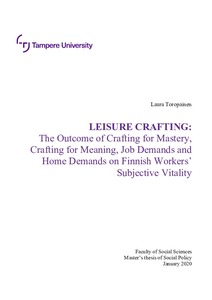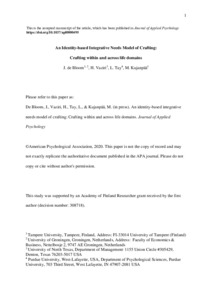Leisure crafting: The Outcome of Crafting for Mastery, Crafting for Meaning, Job Demands and Home Demands on Finnish Workers’ Subjective Vitality
Toropainen, Laura (2020)
Toropainen, Laura
2020
Yhteiskuntatutkimuksen maisteriohjelma - Master's Degree Programme in Social Sciences
Yhteiskuntatieteiden tiedekunta - Faculty of Social Sciences
This publication is copyrighted. You may download, display and print it for Your own personal use. Commercial use is prohibited.
Hyväksymispäivämäärä
2020-02-20
Julkaisun pysyvä osoite on
https://urn.fi/URN:NBN:fi:tuni-202001201397
https://urn.fi/URN:NBN:fi:tuni-202001201397
Tiivistelmä
The aim of this thesis was to explore how two psychological mechanisms, mastery and meaning, are associated with subjective vitality through leisure crafting. In addition, I was interested in investigating whether home demands and job demands are enhancing or buffering the negative effects of leisure crafting (mastery and meaning) on subjective vitality. Theories of the DRAMMA-model, Finnish work-life trends, serious leisure and social acceleration provided a background for the thesis’s central concepts and hypotheses. Crafting for mastery and crafting for meaning were expected to have a positive association with subjective vitality but crafting for mastery was expected to have a more negative association with subjective vitality than crafting for meaning. Home demands and job demands were expected to enhance the negative effects of leisure crafting (mastery and meaning) on subjective vitality.
The data was collected via an online survey for the purpose of the project namely “Making Leisure Work: Leisure Crafting as Active Recovery from Stressful Work” (Academy of Finland, principal investigator dr. Jessica de Bloom). The data consists of 541 respondents of which 85% are female respondents, 61% are over 50 years old and 50% have graduated from comprehensive-, vocational- or upper secondary school.
The measures of the thesis consisted of demographics and averaged variables. Crafting for meaning and crafting for mastery were based on a new scale of off-job crafting that was founded on the DRAMMA-model. The rest of the averaged variables, subjective vitality, home demands and job demands, were founded on the scales that have been tested in earlier studies. The thesis focused on examining relationships by quantitative methods including descriptive analyses, as well as linear regression analysis and moderator analysis.
The results showed that leisure crafting through psychological mechanisms mastery and meaning is beneficial for subjective vitality in general but crafting for meaning was in a stronger positive association with subjective vitality than crafting for mastery. Also, home demands and job demands were negatively associated with subjective vitality which supported the assumption of demands’ enhancing negative effects of leisure crafting (mastery and meaning) on subjective vitality, but the result was not actually consistent with the hypothesis. In fact, even if the home demands were high, the level of subjective vitality remained almost as high as with the group of low home demands, if the group of high demands managed to craft for meaning highly.
The thesis shed light on leisure crafting’s vitality effects from the aspect of the DRAMMA-model’s psychological mechanism mastery and meaning, as well as examined home demands’ and job demands’ relationship to vitality among Finnish workers. The results give valuable insights into how leisure should be crafted in order to maintain a good level of well-being. Workers could benefit from the training related to the balance between leisure and work from the view of leisure crafting, because they might lack sufficient knowledge about the pros and cons of leisure behaviors. Future studies should focus on the motives of individuals’ leisure behaviors and to investigate which factors affect individuals’ leisure behaviors. A deeper understanding of leisure crafting’s benefits would be also a useful topic of future study.
The data was collected via an online survey for the purpose of the project namely “Making Leisure Work: Leisure Crafting as Active Recovery from Stressful Work” (Academy of Finland, principal investigator dr. Jessica de Bloom). The data consists of 541 respondents of which 85% are female respondents, 61% are over 50 years old and 50% have graduated from comprehensive-, vocational- or upper secondary school.
The measures of the thesis consisted of demographics and averaged variables. Crafting for meaning and crafting for mastery were based on a new scale of off-job crafting that was founded on the DRAMMA-model. The rest of the averaged variables, subjective vitality, home demands and job demands, were founded on the scales that have been tested in earlier studies. The thesis focused on examining relationships by quantitative methods including descriptive analyses, as well as linear regression analysis and moderator analysis.
The results showed that leisure crafting through psychological mechanisms mastery and meaning is beneficial for subjective vitality in general but crafting for meaning was in a stronger positive association with subjective vitality than crafting for mastery. Also, home demands and job demands were negatively associated with subjective vitality which supported the assumption of demands’ enhancing negative effects of leisure crafting (mastery and meaning) on subjective vitality, but the result was not actually consistent with the hypothesis. In fact, even if the home demands were high, the level of subjective vitality remained almost as high as with the group of low home demands, if the group of high demands managed to craft for meaning highly.
The thesis shed light on leisure crafting’s vitality effects from the aspect of the DRAMMA-model’s psychological mechanism mastery and meaning, as well as examined home demands’ and job demands’ relationship to vitality among Finnish workers. The results give valuable insights into how leisure should be crafted in order to maintain a good level of well-being. Workers could benefit from the training related to the balance between leisure and work from the view of leisure crafting, because they might lack sufficient knowledge about the pros and cons of leisure behaviors. Future studies should focus on the motives of individuals’ leisure behaviors and to investigate which factors affect individuals’ leisure behaviors. A deeper understanding of leisure crafting’s benefits would be also a useful topic of future study.
Kokoelmat
Samankaltainen aineisto
Näytetään aineisto, joilla on samankaltaisia nimekkeitä, tekijöitä tai asiasanoja.
-
"The Art and Craft of the Machine": 3D printing, the Arts and Crafts Movement and the democratization of art
Patokorpi, Lassi (2014)
Pro gradu -tutkielma1800-luvun lopulla Englannissa syntynyt Arts and Crafts -liike halusi tehdä taiteesta ja tuotannosta demokraattisempaa. Liikkeen merkittävin edustaja oli runoilija, käsityöläinen ja sosialisti William Morris. Nykypäivänä ... -
An Identity-based Integrative Needs Model of Crafting : Crafting within and across life domains
De Bloom, Jessica; Vaziri, Hoda; Tay, Louis; Kujanpää, Miika (2020)
article -
Job Crafting and Off-job Crafting : Well-Being and Satisfaction of Psychological Needs of the DRAMMA-model
Engblom, Anna (2019)
Pro gradu -tutkielmaThe aim of this thesis was to find out whether the negative effect of job and home demands on subjective well-being (SWB) can be buffered by job and off-job crafting. SWB was examined through subjective vitality, mental ...



